
Der Ring des Nibelungen (complete). Stuttgart Opera 2002-3. Production: Joachim Schlömer, Christof Nel, Wieler/Morabito, Peter Konwtischny. Conductor: Lothar Zagrosek. Further information here.
Overview and general comments
At some point during the 1990´s Stuttgart Opera manager
Klaus Zehelein conceived the idea of simply dividing the Nibelungen Ring Tetralogy into four independent operas. Whether a good idea or not remained to be seen, as it had never been done before in the entire history of the work.
So decided, Rheingold was given to director
Joachim Schlöner, Walküre to
Christof Nel, Siegfried to
Jossi Wieler/Sergio Morabito and Götterdämmerung to
Peter Konwitschny.
Three different Brünnhildes were hired, three different Wotans, two different Siegfrieds etc. Each opera was treated as one entity with no connection to the others. According to Klaus Zehelein, the concept carried the “aesthetic advantages to pour everything into each individual work”.
The only continuous aspect to this “cycle” was conductor
Lothar Zagrosek and the orchestra.
The production opened in Stuttgart 1999 to much controversy, though mostly on the positive side. These DVDs are live recordings from the Stuttgart Opera 2002-3.
At the time of release, the only Nibelungen Ring DVDs on the market were the
Chéreau/Boulez 1976 Bayreuth Ring and the
Schenk/Levine Metropolitan Opera production. Thus, the
Stuttgart Ring attracted considerable attention and has widely become known as the epitome of the Regietheater Ring, remaining virtually unchallenged at this position, despite the recent additions the the Nibelungen Ring catalogue (the
Copenhagen Ring, in this respect, comes second).
Whether one takes to these interpretations obviously depends on individual tastes, though a more nuanced discussion of the term
Regietheater is essential: Regietheater does not just cover one branch of directorial approaches, but is rather an umbrella covering several stylistic genres. None of the stagings belong to the genuine
deconstructive school, ie. all four works more or less follow the storyline, though there are a major differences between the psychoanalysis of Christof Nel and the glum comedy of Wieler/Morabito. As ground-breaking Wagnerian music-theater it is impossible to ignore.
Musically, the major achievement is by Lothar Zagrosek and the Stuttgart orchestra, who play
on par with all the DVD competition,
Daniel Barenboim´s Bayreuth Festival orchestra apart. The singers are all dramatically convincing, though vocally, Eva-Maria Westbroek´s Gutrune apart, there are no particular standouts. Neither are there any disasters. A
complete overview of all seven commercially released Nibelungen Ring DVDs may be found here.
The individual operas - Rheingold
Directed by
Joachim Schlömer with sets by Jens Kilian, this Rheingold is a realistically outlined everyday tragedy with an almost Strindbergsk intimacy to the single set of an inner courtyard with an fountain.
Wotan is the tired patriarch of a 1920 business empire. Fricka is both his business partner and wife. Loge is a broker, fixed on his commission. Alberich, an elderly megalomaniac business man. Fafner, the young cunning businessman is accompanied by his elder, naïve brother Fasolt, who truly loves the young and innocent Freia and is loved back in return. Non-speaking characters, such as Alberichs assistant are used extensively and all characters are virtually on stage for the duration of the opera.
No lofty metaphors and no semi-attempts at magic are made: The traditional Tarnhelm is replaced by a mirror, mirroring the self-deception of the characters, so to speak. The Rhinegold is quite simply golden jewelry located in the marble fountain. Needless to say, there is no spear. When Erda arrives, the doors of the courtyard open in the most dramatic moment of the opera. And instead of the sparkling rainbow? The Gods simply disappear down into the cellar at the end.
Not a bad idea and surprisingly coherent as well, thus focusing on the sociopolitial aspects of the piece such as broken labour contracts, slave labour and exploitation.
All singers act well. Unfortunately they don´t all sing well, the major liability being Wolfgang Probst´s frankly disappointing Wotan. Best were
Mette Ejsing as Erda and
Esa Ruuttunen as Alberich, for once not entirely ridiculous, but sincere in both acting and singing.
The courtyard tableau:

The Rhinemaidens with the Rhinegold:

Wotan and Fricka:

The arrival of the "Giants":

Loge´s story:

Alberich with the "Tarnhelm":

Alberich´s shape-changing (consisting mainly of the display of a toy rabbit):

Alberich caught:

Covering Freia:

The arrival of Erda:

Erda and Wotan:

Fafner kills Fasolt:

The Gods disappear underground:

The individual operas - Walküre
According to director
Christof Nel "Humans have the same problems as Gods and vice versa", which is exactly what he brings on stage in a densely psychoanalytically Walküre.
Symbolism is rife throughout in this minimalistic staging, where moods are mainly created by dusty stage-lights.
Hunding´s shack is build from planks with a rudimentary shower in the corner, light barely peeping in. Movements are stylized and symbolically laden gestures are shown in slow-motion:
Sieglinde offering
Siegmund water. Her circling around him. A polite, though significance-laden arm wrestle takes place between Hunding and Siegmund (Hunding wins), and after Hunding has identified Siegmund as his enemy they sit politely opposite each other eating the steak, Sieglinde prepared for them.
Nothung is a projection on the wall, which Siegmund steps through during the Wälse cry. When Sieglinde later steps directly into the projection, Siegmund draws the sword from within her. No doubt there is strong symbolism hidden in this. I am just not entirely sure of what. Neither does the significance of the unusually track-suit clothed Siegmund and Wotan become apparent.
Wotan controls events lying on an air mattress while Brünnhilde positions small soldier figurines on the floor and on a suspended stage of marionettes the deaths of both Siegmund and Hunding are played out just minutes before they happen on the "real" stage. At this point Wotan has already resigned. He knows all is lost and not even Renate Behle´s strong-willed Brünnhilde manages to infuse some life into him.
A conveyor belt transports the fallen heroes in front of a catwalk of 21st century model valkyries. Up front, a veritable newsroom is set up for Wotan to monitor everything and ultimately take leave with Brünnhilde. Some flickering candles on a table and a Wotan-operated spotlight make up for the fire of the Walküre Rock.
Does all of this work? Quite a lot of it does, though admittedly Nel´s sense of aesthetics does not always appeal to me. The psychoanalysis combined with the "Wotan´s miniature" concept is not uncommon in several more recent Walküre interpretations such as
Keith Warner (London),
Claus Guth (Hamburg) and
Braunschweig (Aix-en-Provence), and makes much sense.
Again, all acted well, Wotan apart, who seemed to suffice by moving himself around the stage.
Rootering did get away with it vocally, again demonstrating that Walküre-Wotan poses no real problems for a bass with topnotes (and Rooterings top-notes are not even that well-developed). I thought
Renate Behle a rather fine and gutsy Brünnhilde, and also
Angela Denoke is a wonderful actress, who vocally perhaps could venture slightly further towards the edge.
Hunding´s shack:

Sieglinde and Siegmund:


Hunding arrives home:


A semi-polite arm wrestle:

Nothung:

Sieglinde steps into Nothung:
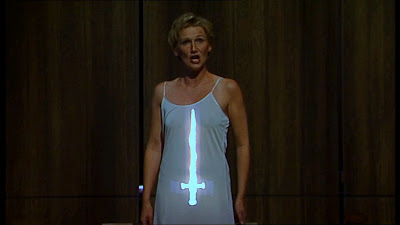
Siegmund drawing the sword out of Sieglinde, quite literally:

Siegmund and Sieglinde - finally free:

Wotan trying, in vain, to control events from his air mattress:

Brünhilde helps him:

Fricka confronts Wotan:

Wotan´s monologue. He has now realized, that all is lost:

Brünnhilde foretelling Siegmunds death:

Wotan controlling the marionette theater by loudspeaker:

The Siegmund marionette falls:

And a couple of seconds later, the real Siegmund falls:

The Valkyries with bodies on conveyor belts:

Wotan and Brünnhilde:

Wotan surveying the Valkyries from his control-room:

The "leb wohl":
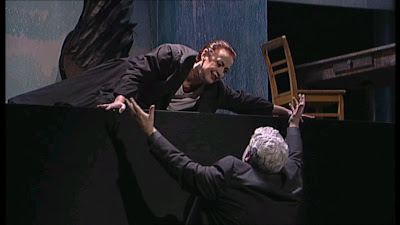
Wotan directing the spotlight:

The spotlight initially hits the side-stage,

finally it hits Brünnhilde sitting by her table with some small candles:

The individual operas - Siegfried
Director Jossi Wieler. Dramaturgy: Sergio Morabito. Sets Anna Viebrock.
This
Siegfried is a glum comedy, set in the 1960´s. A charicatured comic book from start to end, and Siegfrieds T-shirt with the imprinted "Sieg Fried" gives a good indication of what follows. Into Mime´s kitchen arrives the Wanderer, an unsympathetic jaded old rocker, threatening Mime with a gun. Mime is even more pitiful than usual, masturbating after surviving the terrors of the Wanderer.
Act two takes place in front of a military exclusion zone, where
Fafner apparently lives, sitting on a chair, back to the audience. The woodbird is a blind boy. Erda, writes her diary amidst laundry and crumbles in a dirty shower as she goes to sleep. Finally, a bourgeois bedroom awaits Siefried in Act 3, a scene which potentially could have worked out with alternative performer physiques, so to speak.
The grotesque elements are emphasized in this Siegfried in which Wanderer is the only real negative figure.
Vocally,
Jon Frederic West gets reasonably away with it, though he doesn´t look the part. Same goes for
Lisa Gasteen. On the other hand,
Wolfgang Schöne perfectly portraits the jaded rocker, though less so vocally.
Mime´s kitchen:

Siegfried and Mime:

Wanderer and Mime:

Mime:

The forging of Nothung:

Wanderer and Alberich in front of Fafner´s lair:

Siegfried and Fafner:


Siegfried with the Woodbird:

Wanderer with Erda:

Erda crumbling in the old shower, the Woodbird next to her:

Confrontation between Wanderer and Siegfried:

Brünnhilde´s "rock":

Siegfried and Brünnhilde:

The individual operas - Götterdämmerung
According to Klaus Zehelein, the division of the Tetralogy liberates Götterdämmerung from "referring to things outside itself". Thus director
Peter Konwitschny is under no obligation to tie the loose ends from the preceding three evenings together, as in fact, there are no ends to tie. Thus, Konwitschny very much approaches the work at face value.
That the Norns are bag ladies establishes the context for what is to come: A simple wooden stage occasionally wrapped in plastic is used throughout in a staging where any reference to Nordic mythology is ironic. Siegfried, literally dressed as a cave-man steps out of the idyllic past of a romantic parody of a Brünnhilde rock and right into the present-day world of the Gibichungen. Alberich, already half-dead and wrapped in a shroud, comes to finally die the arms of his, for once, rather sympathetic son, Hagen.
No attempts of semi-creations of magic are made and no special effects are seen: Grane is a hobby horse. And the spectacular end? Rather effectively Konwitschny has Wagner´s original stage direction projected on to a giant screen with the redemption motive at the end. Words and music is what remains.
Again, all singers act convincingly, though best of all is
Eva-Maria Westbroek as the best Gutrune on DVD.
Luana DeVol is quite impressive as Brünnhilde and
Albert Bonnema makes up for much with energetic acting. Perhaps Konwitschny didn´t intend Hagen to be malicious and if that is the case,
Roland Bracht lived fully up to expectations.
The Norns:


Siegfried and Brünnhilde on the rock:

Brünnhilde with Grane:

Gunther, Gutrune and Hagen:

Siegfried arrives:

Siegfried and Gutrune:

Siegfried and Gunther swear the oath of friendship:

Brünnhilde with Waltraute:

Siegfried (wearing Gunthers clothes) with Brünnhilde:

Hagen with Alberich:

Hagen´s Call:

Gunther and Brünnhilde:

Gutrune and Siegfried:

Brünnhilde accuses Siegfried of treachery:
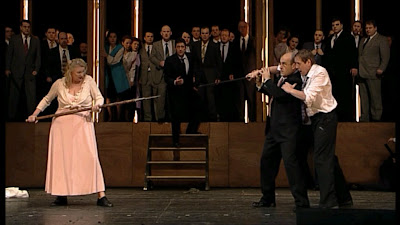
Brünnhilde, Gunther and Hagen plan their revenge:
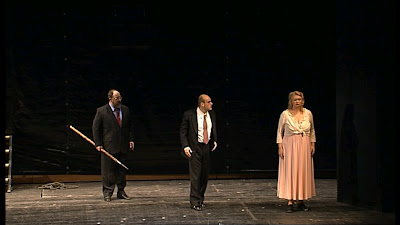
Siegfried with the Rhinemaidens:

The dying Siegfried among the men:

Siegfried´s Funeral March:
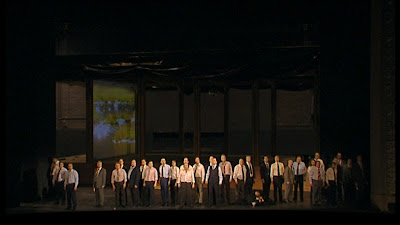
Gutrune anxiously awaiting her husband (with Grane):

Lamenting Siegfrieds death:

Siegfried (by now dead) simply gives the Ring to Brünnhilde:

Brünnhilde towards the end:

The end (note that no fire is seen in this staging):

The singers
Generel comments:Generally the quality of the casting is rather high, all singers being dramatically convincing in their respective parts. Not a small accomplishment, taking into consideration that none of these are so-called A-list singers.
Wotan - Rheingold: Wolfgang Probst is frankly disappointing. Severely overchallenged, he often retorts to barking.
Wotan - Walküre: A bass, Jan-Hendrik Rootering effortless navigates the depths of the monologue and the Farewell he manages as well. Though there is not much to extract in terms of interpretation.
Wotan-Wanderer: Wolfgang Schöne is perfect as the jaded, unsympathetic rocker. Vocally he is not exceptional lacking the beauty in tone as well as legatolines, and seems somewhat past his prime.
Fricka - Rheingold: Michaela Schuster is dramatically convincing, though not overly exciting, which fits the production rather well.
Fricka - Walküre: Fine, stylish performance from Tichina Vaughn
Alberich -Rheingold: Esa Ruuttunen is a rather fine Alberich, with sincerity in both singing and acting.
Alberich – Siegfried: Björn Waag´s high barytone projects well over the orchestra and his acting is equally convincing.
Alberich-Götterdämmerung: Franz-Josef Kapellmann makes the most out of being a half-dead corpse in his rather short entry.
Loge: Robert Künzli makes a rather unusual Loge, being rather subservant than diabolic and sharp, which works rather well.
Fasolt: Roland Bracht, dramatically convincing as the elder subdued brother.
Fafner-Rheingold: Phillip Ens is fine as the younger rogue.
Fafner-Siegfried: Attila Jun repeats his unmenacing Hunding, now a friendly dragon.
Mime-Rheingold: Fine characterization by Eberhard Francesco Lorenz.
Mime-Siegfried: Heinz Göhrig plays the ultimately pathetic Mime virtually to perfection
Sieglinde: Angela Denoke is a superb actress and looks great. She is in fine voice as well.
Siegmund: Robert Gambill gets aways with it without distinguishing himself one way or the other.
Hunding: A remarkable un-menacing performance from Attila Jun.
Hagen: A more benevolent Hagen than Roland Bracht I have never seen. He can sing the notes, but a bit more punch would not have been amiss.
Brünnhilde-Walküre: Strong performance from Renate Behle. She hits all the notes, on pitch, no wobbling and furthermore creates a convincing character and looks the part reasonably.
Brünnhilde-Siegfried: Lisa Gasteeen sings the notes adequately but doesn´t exactly create drama or suspense on stage.
Brünnhilde-Götterdämmerung: Strong performance, especially dramatically, from Luana DeVol, who sings with full force all the way through.
Siegfried-Siegfried: Jon Frederic West gets reasonably away with it though slightly thin vocally.
Siegfried-Götterdämmerung: Albert Bonnema may be vocally overchallenged, increasingly evident as the evening progresses, though his energetic acting makes up for much.
Erda-Rheingold: With a dark, dramatic contralto, Mette Ejsing convincingly establishes the character of Erda
Erda-Siegfried: Helene Ranada does not quite reach the dramatic level of Mette Ejsing from Rheingold.
Waltraute: Fine performance from Tichina Vaughn.
Gutrune: Superb performance from Eva-Maria Westbroek, probably the highlight of the cycle.
Gunther: Hernan Iturralde makes the most of this rather thankless part.
The conductor and orchestra
Lothar Zagrosek and the quite spectacular Stuttgart orchestra is one of the major positive aspects of this Cycle. The tempi are relatively brisk, and for once it works well, never sounding rushed or superficial. Apart from
Daniel Barenboim´s Bayreuth orchestra, they play as well as any of the competition on DVD.
In brief - The highlights and lowlights
The highlights:The innovative concept. The playing of the Stuttgart orchestra under Zagrosek.
The lowlights:Some of the lead characters disappoint vocally, though rarely dramatically.
The bottom line (scale of 1-5, 3=average):
The ratings are given in comparison to the other Ring DVDs available. As ever, the acting skills of the singers weigh in heavily.
Wolfgang Probst (Rheingold-Wotan): 2
Michaela Schuster (Rheingold-Fricka): 3-4
Esa Ruuttunen (Rheingold-Alberich): 3-4
Robert Künzli (Loge): 3-4
Roland Bracht (Fasolt): 3-4
Phillip Ens (Rheingold-Fafner): 3-4
Eberhard Francesco Lorenz (Rheingold-Mime): 3-4
Mette Ejsing (Rheingold-Erda): 4
Robert Gambill (Siegmund): 3
Angela Denoke (Sieglinde): 4
Attila Jun (Hunding): 3
Roland Bracht (Hagen): 3
Renate Behle (Walküre-Brünnhilde): 4
Jan-Hendrik Rootering (Walküre-Wotan): 3
Wolfgang Schöne (Wanderer): 3
Heinz Göhrig (Mime): 3-4
Björn Waag (Siegfried-Alberich): 4
Helene Ranada (Siegfried-Erda): 3
Attila Jun (Siegfried-Fafner): 3
Jon Frederic West (Siegfried-Siegfried): 3
Lisa Gasteen (Siegfried Brünnhilde): 3
Albert Bonnema (Götterdämmerung-Siegfried): 3
Luana DeVol (Götterdämmerung-Brünnhilde): 4
Franz-Josef Kapellmann (Götterdämmerung-Alberich): 3-4
Eva-Maria Westbroek (Gutrune): 5
Hernan Iturralde (Gunther): 3-4
Tichina Vaughn (Waltraute): 4
Joachim Schlöner´s Rheingold staging: 3-4
Christof Nel´s Walküre staging: 4
Wieler/Morabito´s Siegfried: 3
Konwitschny´s Götterdämmerung staging: 3-4
Lothar Zagrosek: 4
Overall impression: 3-4

















































































